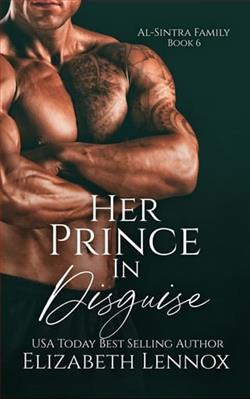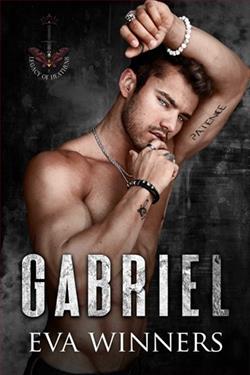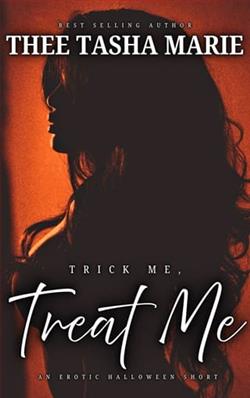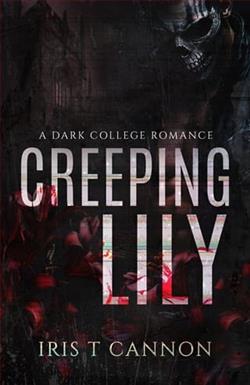Page 2 of Healer to the Ash King
We pelt across another field and down a slope to the clusters of cottages that make up our village. I’m covered in a light sheen of sweat. The upper curves of my breasts, exposed by the bandeau I’m wearing, are slick with it. I draw some water from a nearby rain barrel, create a fine mist, and walk through it to cool myself. Now I’m even wetter. Wonderful.
“He’s in the square.” Peach is peering around the corner of a house. “There.”
I lean over him to get a peek. Peach is ten, fourteen years younger than me, and much shorter. Since I have no siblings, the younger village children fill that role for me. They look at me with a kind of grateful, loving awe, because I’m the one who can settle their nauseated stomachs, soothe their fevers, ease their coughs, and eradicate the more dangerous plagues that sometimes crawl through our region.
Over Peach’s messy brown hair I catch my first glimpse of the King. He’s sitting on a horse the color of volcanic ash, and his long white hair flows unbound in the breeze. Set across his forehead is a crown of black-iron leaves. He’s young, pale, and handsome, dressed heavily in a black coat of brocade and velvet with dramatically pointed epaulets of metal and leather. At his side hangs a black sheath, from which rises the elaborate gilded handle of his famous sword, Witherbrand. A dark name for a very pretty weapon.
Wicked and volatile he might be, but he's fully dressed and clean, which is more than I can say for myself.
I withdraw into the shadow of the house and press my back to the wall, my heart thundering. “I can’t go out there,” I whimper.
“You have to.” Peach grips my wrist. “Maybe he’s going to give you a prize for being such an amazing healer. My mother says you’re the best in the land. She says she’s never heard of anyone else who can heal putrepox or hibernal fever.”
“I’m not the best,” I whisper. “I don’t want to meet the Ash King, Peach. What if he decides I need to be Muted?”
Peach scoffs. “Why would he think that? Come on.”
Peach doesn’t know the true extent of my powers—the other side of what I can do. In addition to weaving torn flesh together or reversing its decay, I can also unwind flesh and hasten its corrosion. I can rot, atrophy, and disintegrate as easily as I can cure, renew, or rejuvenate.
When I was younger, I tested my darker powers on plants and animals, just twice, and I immediately reversed the damage I caused and vowed never to experiment with that side of my magic again. Instead, I focus on doing all the good that I can. While I cannot completely stop the effects of time on a person, I can help them stay young and healthy longer than they naturally would. The goodwives of my village attribute their long-lasting beauty to volcanic-ash masks and mud baths, but that’s not why the people of my village look so fine and healthy. It’s me.
None of the Ricters who have tested me have commented on the flip side of my powers. I’m not sure any of them realized I could do more than heal people and manipulate water. They mentioned the strength of my resonance and requested the standard three witnesses to testify about the nature of my abilities, but there was no further comment. I’ve never known why, and I’ve never dared to ask.
Surely I’m not the only healer who can also harm. Or perhaps I am. Magic wielders are rare in our kingdom, and few have dual powers like mine: elemental control and healing ability.
What if someone else passing through our village realized the truth about my powers, and told the Ash King? But wouldn’t he just send Ricters to Mute me? Why come here himself?
Peach is pulling me out of my hiding place, and I’m letting him, because I’ve heard what happens to those who don’t obey the king. They disappear into dungeons, and their family’s possessions are confiscated. Sometimes they’re beaten, mutilated, or executed.
The king doesn’t permit rebellion in any form. And I don’t wish to anger him, so I follow Peach out of the alley, into the village square. Everyone who wasn’t in the fields is here, waiting in curious clusters. The Ash King sits silent on his horse, surrounded by a retinue of half a dozen guards and a herald. Not that he needs the guards—he could level our village and all our fields in one burst of fiery rage.
Another reason I shouldn’t resist him or try to run, though every instinct I have is shrieking at me to flee.
My bare feet scuff the stone pavers of the town square. I’m disheveled, damp, soil-stained, barely dressed.
My knees are shaking, so it’s easy to kneel in front of the Ash King. I’m not sure how I’ll get back up.
Head bowed, I address him.
“Your Majesty,” I say. “You asked for me?”
2
I wait on my knees, while the sun presses warm on my head and the fresh breeze whispers across my heated skin. The musky smell of horse mingles with the bitter tang of smoke from the nearby forge, abandoned so our blacksmith can watch my humiliation.
My people won’t glory in this, though. Sensing emotion isn’t one of my abilities, but I can practically feel their sympathy and concern surging around me, supporting me. These people love me, and I love them. Nothing the Ash King can do will erase that truth.
“Is this a joke?” says a voice somewhere above me—a cold voice with a hissing undercurrent of rage, like red-hot iron plunged into icy water.
Louder the voice speaks. “Is this your healer? The Cailin of whom I was told?”
A throat is cleared, and our village leader, the Ceannaire, speaks. “Yes, Highness,” she says. “This is Cailin, our healer. She is a blessing to our village and to those nearby. Her skills irrigate the fields, soothe our elderly, strengthen our—”
“I didn’t ask for her biography,” interjects the cold-hot voice. “I’m aware of her powers. I wasn’t aware she’d be a beggarly orphan.”
My head whips up before I can stop it, and my eyes lock with the dark eyes of the Ash King. His upper lip is hitched in a sneer.
“I am neither a beggar nor an orphan,” I say.















